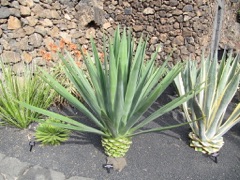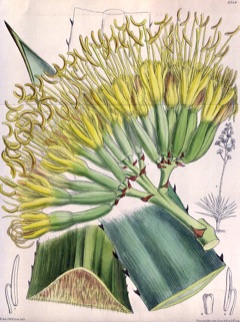 |
|
https://edibleplants.org/ |
 |
| https://edibleplants.org/ |
Translate this page:
Summary
Physical Characteristics

 Agave fourcroydes is an evergreen Perennial growing to 1.8 m (6ft) by 1.8 m (6ft) at a medium rate.
Agave fourcroydes is an evergreen Perennial growing to 1.8 m (6ft) by 1.8 m (6ft) at a medium rate.
See above for USDA hardiness. It is hardy to UK zone 10.
Suitable for: light (sandy), medium (loamy) and heavy (clay) soils, prefers well-drained soil and can grow in nutritionally poor soil. Suitable pH: mildly acid, neutral and basic (mildly alkaline) soils. It cannot grow in the shade. It prefers dry or moist soil and can tolerate drought.
UK Hardiness Map
US Hardiness Map
Synonyms
Agave rigida elongata Baker Agave sullivanii Trel.
Plant Habitats
Edible Uses
References More on Edible Uses
Medicinal Uses
Plants For A Future can not take any responsibility for any adverse effects from the use of plants. Always seek advice from a professional before using a plant medicinally.
The plant is used for medicinal purposes[317 ].
References More on Medicinal Uses
The Bookshop: Edible Plant Books
Our Latest books on Perennial Plants For Food Forests and Permaculture Gardens in paperback or digital formats.

Edible Tropical Plants
Food Forest Plants for Hotter Conditions: 250+ Plants For Tropical Food Forests & Permaculture Gardens.
More

Edible Temperate Plants
Plants for Your Food Forest: 500 Plants for Temperate Food Forests & Permaculture Gardens.
More

More Books
PFAF have eight books available in paperback and digital formats. Browse the shop for more information.
Shop Now
Other Uses
Agroforestry Uses: The plants are cultivated as hedges and living fences in Cuba[317 ]. Other Uses A fibre is obtained from the leaves[317 ]. Coarser than the fibres from sisal (Agave sisalana), they are used for the production of ropes, nets, floor-covering and harvest binding strings[317 ]. The roots contain saponins and can be used as a soap substitute[331 ].
Special Uses
Carbon Farming
References More on Other Uses
Cultivation details
Agroforestry Services: Living fence Industrial Crop: Fiber Management: Standard Minor Global Crop
A plant of the drier tropics. It grows best in areas where annual daytime temperatures are within the range 15 - 30c, but can tolerate 10 - 40c[418 ]. It can be damaged by temperatures of -5c or lower[418 ]. It prefers a mean annual rainfall in the range 900 - 1,250mm, but tolerates 700 - 2,500mm[418 ]. Requires a sunny position in a well-drained soil. Prefers a pH in the range 6.5 - 7.5, tolerating 6 - 8[418 ]. It require 4 - 6 years to first harvest, and the leaves can subsequently be harvested twice a year[418 ]. A monocarpic species - the plant lives for a number of years without flowering but dies once it does flower. However, it normally produces plenty of suckers during its life and these continue growing, taking about 10 - 15 years in a warm climate, considerably longer in colder ones, before flowering[11 ]. In Mexico the plant has a life cycle of 15 - 30 years[418 ]. This species is a sterile hybrid taxon[317 ].
Carbon Farming
-
Agroforestry Services: Living fence
Simply managed rows of shrubs and trees.
-
Industrial Crop: Fiber
Clothing, rugs, sheets, blankets etc. Currently, almost none of our fiber are produced from perennial crops but could be!
-
Management: Standard
Plants grow to their standard height. Harvest fruit, seeds, or other products. Non-Destructive management systems.
-
Minor Global Crop
These crops are already grown or traded around the world, but on a smaller scale than the global perennial staple and industrial crops, The annual value of a minor global crop is under $1 billion US. Examples include shea, carob, Brazil nuts and fibers such as ramie and sisal.
References Carbon Farming Information and Carbon Sequestration Information
Temperature Converter
Type a value in the Celsius field to convert the value to Fahrenheit:
Fahrenheit:
The PFAF Bookshop
Plants For A Future have a number of books available in paperback and digital form. Book titles include Edible Plants, Edible Perennials, Edible Trees,Edible Shrubs, Woodland Gardening, and Temperate Food Forest Plants. Our new book is Food Forest Plants For Hotter Conditions (Tropical and Sub-Tropical).
Shop Now
Plant Propagation
One source suggests Agave fourcroydes is like sisal, a sterile hybrid; the ovaries never produce seeds. The plant does produce bulbils that may be planted, but commercial growers prefer to use the frequent suckers, which develop more quickly.
Other Names
If available other names are mentioned here
Native Range
NORTHERN AMERICA: Mexico (Yucatán)
Weed Potential
Right plant wrong place. We are currently updating this section.
Please note that a plant may be invasive in one area but may not in your area so it's worth checking.
Conservation Status
IUCN Red List of Threatened Plants Status : This taxon has not yet been assessed

Growth: S = slow M = medium F = fast. Soil: L = light (sandy) M = medium H = heavy (clay). pH: A = acid N = neutral B = basic (alkaline). Shade: F = full shade S = semi-shade N = no shade. Moisture: D = dry M = Moist We = wet Wa = water.
Now available:
Food Forest Plants for Mediterranean Conditions
350+ Perennial Plants For Mediterranean and Drier Food Forests and Permaculture Gardens.
[Paperback and eBook]
This is the third in Plants For A Future's series of plant guides for food forests tailored to
specific climate zones. Following volumes on temperate and tropical ecosystems, this book focuses
on species suited to Mediterranean conditions—regions with hot, dry summers and cool, wet winters,
often facing the added challenge of climate change.
Read More
Expert comment
Author
Lem.
Botanical References
Links / References
For a list of references used on this page please go here
A special thanks to Ken Fern for some of the information used on this page.
Readers comment
| Add a comment |
|
If you have important information about this plant that may help other users please add a comment or link below. Only comments or links that are felt to be directly relevant to a plant will be included. If you think a comment/link or information contained on this page is inaccurate or misleading we would welcome your feedback at [email protected]. If you have questions about a plant please use the Forum on this website as we do not have the resources to answer questions ourselves.
* Please note: the comments by website users are not necessarily those held by PFAF and may give misleading or inaccurate information.
To leave a comment please Register or login here All comments need to be approved so will not appear immediately.
|
Subject : Agave fourcroydes
|
|
|
|